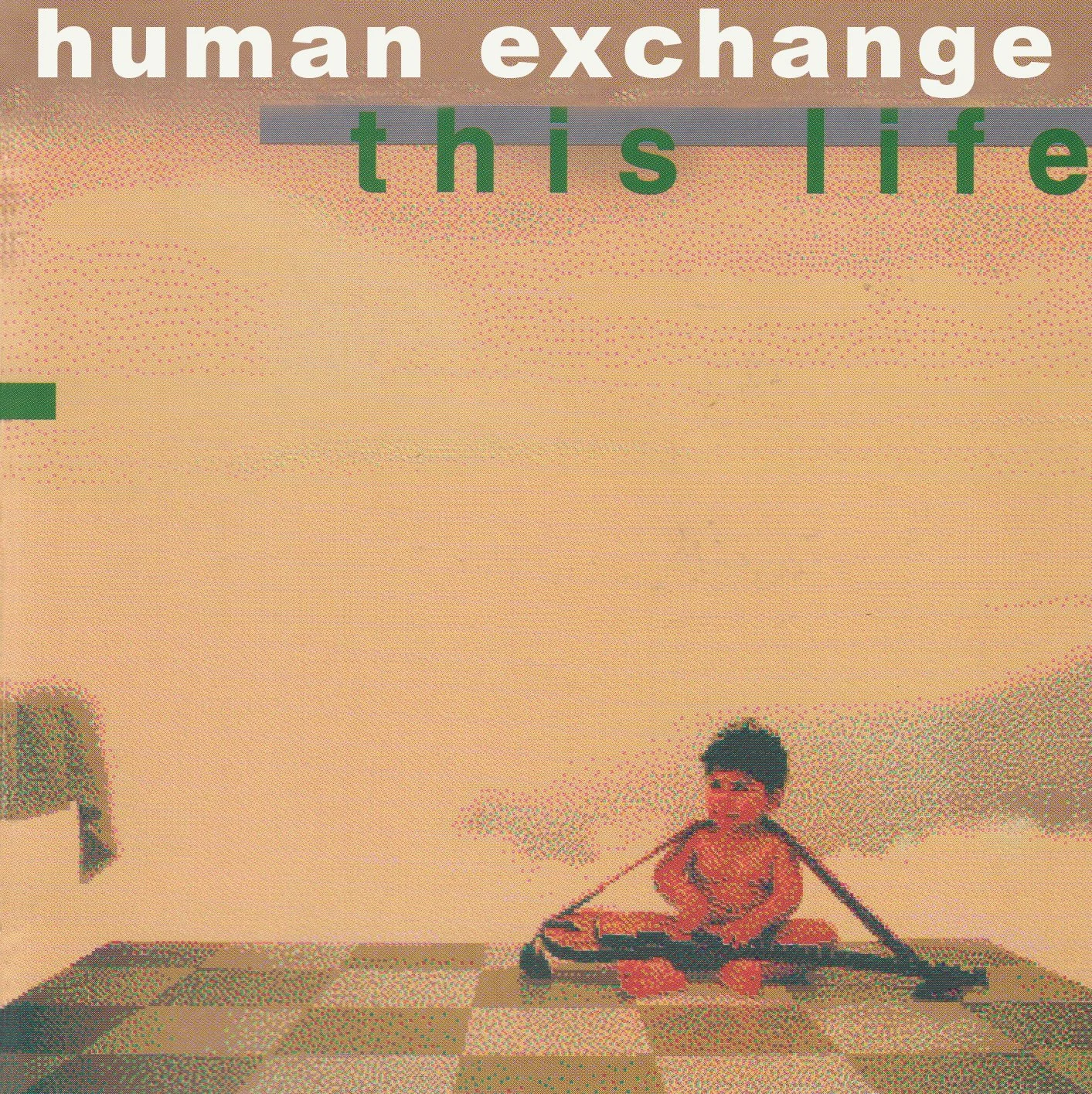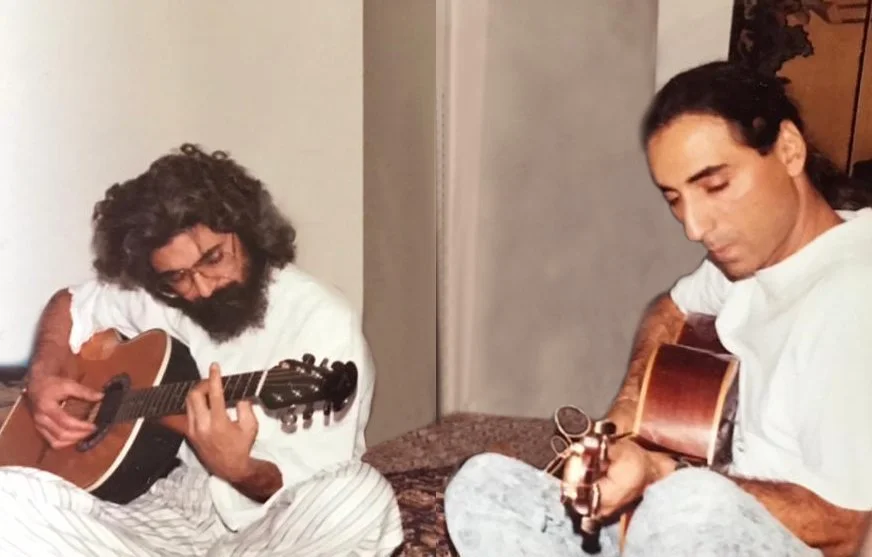Koorosh Angali
Art Director, Musician, Artist, Poet, Writer.
Koorosh Angali, visual artist, poet, musician and writer. The winner of numerous awards and scholarships in visual arts, music, and academic endeavors, Koorosh Angali is a prolific multi-talented artist and scholar: painter, poet, musician, stage actor, and a virtuoso exponent of Rumi's poetry, and Persian classical literature. As a poet (In Search of One's Own Self, 1995, Nashr-e Ketab Publications, Los Angeles) and lyricist, his compositions have been published and performed profusely. Moreover, for many years, the followers of Rumi's philosophy and poetry have enjoyed Koorosh's distinctive style in reading and interpretation of the poetry of this thirteenth century Persian philosopher and poet.
Koorosh Angali - Bass
The awards Koorosh has received include the San Francisco Weekly Magazine Wammies Award for his lyrics in the album The Child Within (X DOT 25 Music, 1992), by Human Exchange. He also collaborated with Alan Kushan on Koorosh Angali Recites Rumi - Volume 1. He has also composed a large number of musical pieces and tracks for stage plays, including an operetta for The Wise Piglet, by Roham Sheikhani. Koorosh Angali has constantly been a student of his heritage, incorporating the magnificent aspects of his culture in his painting, poetry, and music.
"As an obsession since childhood, painting has been my number one occupation and everything else orbits around this sphere. Nevertheless, art, in general, has always been my "occupation" par excellence: my poetry supports my painting; I compose music to nurture these two; I do all three to be alive and then I perform, and the stage is the final thrill for me—my ultimate reward. For me, these worlds are inseparable."
—Koorosh Angali
Human Exchange (Koorosh Angali & Aldoush) at Ashkenaz in Berkeley (Circa 1990)
Koorosh & Aldoush Writing Songs
Album Details:
Koorosh Angali Recites Rumi - Volume I
Featuring Alan Kushan on SanturKoorosh Angali - Rumi Recording Sessions, Richmond California.
X DOT 25 Music Productions celebrated Rumi's 790th birthday on September 30, 1997, with this spiritual journey into the realm of Persian verse and music.
Koorosh Angali & Alan Kushan Rumi Recording Sessions, Richmond California.
To mark Rumi's 790th birthday and more exposure for this great Persian poet and philosopher, X DOT 25 Music released a 60 minute CD containing poems from Rumi's "Divaan-e Kabeer" book accompanied by music performed by Santur Maestro Alan Kushan (the Dusty Man).
For many years, the followers of Rumi's philosophy have enjoyed Koorosh's interpretations in reading the poetry of this thirteenth century philosopher/poet. The San Francisco Weekly Magazine Wammies Award winner, Koorosh Angali has constantly been a student of his heritage, incorporating the magnificent aspects of his culture in his painting, poetry, and music.
Koorosh and Alan are currently working on the sequel to the first Rumi project. It is currently under production. All the poems are selected and recordings are under way. To be released beginning 2026. Stay tuned.
Koorosh Angali, Alan Kushan and Max Ahmadi - Rumi Recording Sessions
Tracks:
1. The Essence 4:05
2. A Drink of Fire 3:05
3. Hush Up! 3:36
4. The Nocturnal Trip 4:15
5. Wounded 3:01
6. Our Beloved 5:27
7. Without You 6:03
8. The Bond 4:45
9. Body and Soul 4:40
10. Blend 5:52
11. Yield 5:25
12. Restless 4:51
13. Rumi’s Solo Santur: 3:40
Item # CD 6001-2
Producers: X DOT 25 Music
Mixing and Mastering at Konstantine’s studioes in San Bruno, California with Max Ahmadi (Executive Producer) and Konstantine Barnov (Senior Sound Engineer)
Koorosh Angali: Verse Recital, Keyboards, Percussion
Alan Kushan: Santur, Percussion
Conceived by Koorosh Angali and X DOT 25
Producer: Koorosh Angali
Co Producer: X DOT 25
Executive Producers: X DOT 25
Recorded by: Dan Brandon at DB Productions, Richmond, California, April, 1997
Mixed by: X DOT 25 and Konstantine Barnov at Sonodrome Digital Lab, San Francisco, California, July, 1997
Cover design and computer support: Koorosh Angali
Koorosh Angali's picture: Max Ahmadi
Cover background (mosque): Roloff Beny, from his Persia: Bridge of Turquoise, 1975
All music in this album is played spontaneously in a jam session.
Koorosh Angali, a virtuoso exponent of Rumi's poetry, and Persian classical literature, is himself a poet ("In Quest Of One's Self," 1995, Nashr-e Ketab Publications, Los Angeles). For many years, the followers of Rumi's philosophy have enjoyed Koorosh's interpretations in reading the poetry of this thirteenth century philosopher/poet. The San Francisco Weekly Magazine Wammies Award winner, Koorosh Angali has constantly been a student of his heritage, incorporating the magnificent aspects of his culture in his painting, poetry, music, and performance.
Alan Kushan Rumi Recording Sessions, Richmond California.
"Rumi I - Koorosh Angali Recites Rumi" is the first of a series of compact disks which will be released by X DOT 25 Music, bringing to audio the words and wisdom of Rumi to a broader audience around the world. Here Koorosh Angali (himself a poet) recites a selection of Mawlana Jalal ad-Din Mohammad Balkhi's odes from the diwan (poetical miscellany) of Shams Tabrizi. In this album we used Rumi's original Persian language, in which these penetrating words were written, so you can hear it the way it originally sounded, to realize why Mawlana has so dearly entered so many hearts in the world throughout the past eight centuries. Alan Kushan accompanies Koorosh Angali with some magnificent santur pieces setting the mode for the wisdom of "the Master", whose verses are praised by millions of Sufis and the followers of mysticism, spirituality, and eastern philosophy. There are interpretations of every poem in English in the liner notes of this great compact disk. Koorosh Angali, a virtuoso exponent of Rumi's poetry, and Persian classical literature, is himself a poet ("In Quest Of One's Self," 1995, Nashr-e Ketab Publications, Los Angeles).
Jelâl Ad-dîn Muhammad Balkhi was nicknamed "Mawlânâ" (Our Master) by the Middle Eastern mystics, and is wrongly known as Rumi in the West - due to the fact that he spent the latter part of his life, and died, in Kunya, the city in Turkey which is also known as the Eastern Rome (hence the words Rum and Rumi 'from Rum').
He was born on September 30, 1207 in Balkh, a city in Afghanistan which was a part of the Persian empire at that time. His father, Bahâ' Ad-dîn Muhammad - known as Bahâ' Walad, also was a practitioner of a Sufi sect known as Kobrawi (the followers of Nadjm Ad-dîn Kobri), and as a reputable preacher he also was called Sultan Al Ulamâ' (the King of the Learned/Scholar).
His family probably fled from Balkh around 1219-20 AD, due to the invasion of Eastern Iran by the Mongols. They first went to Baghdad but soon headed for Hijaz, in an attempt to pay a visit to Ka'ba. From there they went, first to Syria and then settled in Kunya, where Mawlânâ spent the rest of his life until his death on December 17, 1273.
The "event" of his life was his meeting with Shams of Tabriz (Shams Ad-dîn Muhammad ibn Ali ibn Malak-dâd Tabrizi), a slender tall wandering Sufi in his sixties with piercing, yet kind eyes and a sad suffering face, sometime in the December of 1245 AD. It was only after this encounter that Mawlânâ realized what he had learned in his religious and gnostic studies and what they really meant. That was his first encounter with the real meaning of Life.
The numbers in the following refer to the assignment found in the Foruzanfar edition of Kulliyat-e Shams (Negah Publication, Tehran, 1994)
Lyrics
1. The Essence (#58)
Music+Verse, 4:05
Here comes the King, the Master.
He is the soul of the soul of the soul, and thus he leads the way,
And we are to submit to him without a word.
رسید آن شه رسید آن شه بیارایید ایوان را
فروبرید ساعدها برای خوب کنعان را
چو آمد جان جان جان نشاید برد نام جان
به پیشش جان چه کار آید مگر از بهر قربان را
بدم بیعشق گمراهی درآمد عشق ناگاهی
بدم کوهی شدم کاهی برای اسب سلطان را
اگر ترکست و تاجیکست بدو این بنده نزدیکست
چو جان با تن ولیکن تن نبیند هیچ مر جان را
هلا یاران که بخت آمد گه ایثار رخت آمد
سلیمانی به تخت آمد برای عزل شیطان را
بجه از جا چه میپایی چرا بیدست و بیپایی
نمیدانی ز هدهد جو ره قصر سلیمان را
بکن آن جا مناجاتت بگو اسرار و حاجاتت
سلیمان خود همیداند زبان جمله مرغان را
سخن بادست ای بنده کند دل را پراکنده
ولیکن اوش فرماید که گرد آور پریشان را
2. A Drink of Fire (#2295)
Music+Verse, 3:05
There you come, all drunken, o my beloved soul-snatcher!
Let me have that fire-filled chalice:
I'll drink it up with pleasure.
Set my harvest afire: ''tis the nature of Love
that the lover should be as homeless as a vagabond.
Behold! My heart is like a glass-blowers shop, yours, like a rock.
سراندازان همیآیی نگارین جگرخواره
دلم بردی نمیدانم چه آوردی دگرباره
فغان از چشم مكارت كز اول بود این كارت
كه پاره پاره پیش آیی و بربایی دل پاره
برای ماه بیچون را كشیدی جور گردون را
مسلم گشت مجنون را كه عاقل نیست این كاره
بیار آن جام پرآتش كه تا ما دركشیمش خوش
به عشق روی آن مهوش برون از چرخ و استاره
بزن آتش به كشت من فكن از بام طشت من
كه كار عشق این باشد كه باشد عاشق آواره
اگر زخمی زنی از كین به قصد این دل مسكین
بزن كه زخم بردارد چه باید كرد بیچاره
دلم شد جای اندیشه و یا دكان پرشیشه
بگو ای شمس تبریزی دلت سنگ است یا خاره
3. Hush Up! (#95)
Music+Verse, 3:36
Oh, how wonderful, how beautiful is the love we possess!
No shackles, no chains, and yet,
We are bound ever so tightly.
What is the secret? O Lord, what is the secret?
Whatever it is, Hush up!
There are strangers all around.
Hush up!
زهی عشق زهی عشق که ما راست خدایا
چه نغزست و چه خوبست و چه زیباست خدایا
چه گرمیم چه گرمیم از این عشق چو خورشید
چه پنهان و چه پنهان و چه پیداست خدایا
زهی ماه زهی ماه زهی باده همراه
که جان را و جهان را بیاراست خدایا
زهی شور زهی شور که انگیخته عالم
زهی کار زهی بار که آن جاست خدایا
فروریخت فروریخت شهنشاه سواران
زهی گرد زهی گرد که برخاست خدایا
فتادیم فتادیم بدان سان که نخیزیم
ندانیم ندانیم چه غوغاست خدایا
ز هر کوی ز هر کوی یکی دود دگرگون
دگربار دگربار چه سوداست خدایا
نه دامیست نه زنجیر همه بسته چراییم
چه بندست چه زنجیر که برپاست خدایا
چه نقشیست چه نقشیست در این تابه دلها
غریبست غریبست ز بالاست خدایا
خموشید خموشید که تا فاش نگردید
که اغیار گرفتست چپ و راست خدایا
4. The Nocturnal Trip (#542)
Music+Verse, 4:15
This love is like the daylight, concealed in the night.
He who is aware of this light would set his sleep afire:
Thus does Venus vie the Moon: through this nocturnal trip, We are able to abandon our earthly shape.
بی گاه شد بیگاه شد خورشید اندر چاه شد
خیزید ای خوش طالعان وقت طلوع ماه شد
ساقی به سوی جام رو ای پاسبان بر بام رو
ای جان بیآرام رو کان یار خلوت خواه شد
اشکی که چشم افروختی صبری که خرمن سوختی
عقلی که راه آموختی در نیم شب گمراه شد
جانهای باطن روشنان شب را به دل روشن کنان
هندوی شب نعره زنان کان ترک در خرگاه شد
باشد ز بازیهای خوش بیذوق رود فرزین شود
در سایه فرخ رخی بیدق برفت و شاه شد
شب روحها واصل شود مقصودها حاصل شود
چون روز روشن دل شود هر کو ز شب آگاه شد
ای روز چون حشری مگر وی شب شب قدری مگر
یا چون درخت موسیی کو مظهر الله شد
شب ماه خرمن میکند ای روز زین بر گاو نه
بنگر که راه کهکشان از سنبله پرکاه شد
در چاه شب غافل مشو در دلو گردون دست زن
یوسف گرفت آن دلو را از چاه سوی جاه شد
در تیره شب چون مصطفی میرو طلب میکن صفا
کان شه ز معراج شبی بیمثل و بیاشباه شد
خاموش شد عالم به شب تا چست باشی در طلب
زیرا که بانگ و عربده تشویش خلوتگاه شد
ای شمس تبریزی که تو از پرده شب فارغی
لاشرقی و لاغربیی اکنون سخن کوتاه شد
5. Wounded (#3108)
Music+Verse, 3:01
I am all wounded, burning and restless,
And all because of your love.
به دست هجر تو زارم تو نیز میدانی
طمع به وصل تو دارم، تو نیز میدانی
چو در دل آمد عشق تو و قرار گرفت
نماند صبر و قرارم، تو نیز میدانی
نهفته شد گل، و بلبل پرید از چمنم
بدرد خستهٔ خارم، تو نیز میدانی
به ناله باز سپیدم، بسان فاخته شد
به کوهسار چو سارم، تو نیز میدانی
انار بودم خندان، بران عقیق لبت
کنون چو شعلهٔ نارم، تو نیز میدانی
انار عشق تو بودست شمس تبریزی
که برد بر سردارم، تو نیز میدانی
6. Our Beloved (#44)
Music+Verse, 5:27
Who has ever seen a Lord like ours?
Never he shows a bitter face to us,
Though he sees so many wrong-doings from us.
در دو جهان لطیف و خوش همچو امیر ما کجا
ابروی او گره نشد گر چه که دید صد خطا
چشم گشا و رو نگر جرم بیار و خو نگر
خوی چو آب جو نگر جمله طراوت و صفا
من ز سلام گرم او آب شدم ز شرم او
وز سخنان نرم او آب شوند سنگها
زهر به پیش او ببر تا کندش به از شکر
قهر به پیش او بنه تا کندش همه رضا
آب حیات او ببین هیچ مترس از اجل
در دو در رضای او هیچ ملرز از قضا
سجده کنی به پیش او عزت مسجدت دهد
ای که تو خوار گشتهای زیر قدم چو بوریا
خواندم امیر عشق را فهم بدین شود تو را
چونک تو رهن صورتی صورت توست ره نما
از تو دل ار سفر کند با تپش جگر کند
بر سر پاست منتظر تا تو بگوییش بیا
دل چو کبوتری اگر میبپرد ز بام تو
هست خیال بام تو قبله جانش در هوا
بام و هوا تویی و بس نیست روی به جز هوس
آب حیات جان تویی صورتها همه سقا
دور مرو سفر مجو پیش تو است ماه تو
نعره مزن که زیر لب میشنود ز تو دعا
میشنود دعای تو میدهدت جواب او
کای کر من کری بهل گوش تمام برگشا
گر نه حدیث او بدی جان تو آه کی زدی
آه بزن که آه تو راه کند سوی خدا
چرخ زنان بدان خوشم کآب به بوستان کشم
میوه رسد ز آب جان شوره و سنگ و ریگ را
باغ چو زرد و خشک شد تا بخورد ز آب جان
شاخ شکسته را بگو آب خور و بیازما
شب برود بیا به گه تا شنوی حدیث شه
شب همه شب مثال مه تا به سحر مشین ز پا
7. Without You (#140)
Music+Verse, 6:03
Without you may there not be, A remedy for my pain.
درد ما را در جهان درمان مبادا بیشما
مرگ بادا بیشما و جان مبادا بیشما
سینههای عاشقان جز از شما روشن مباد
گلبن جانهای ما خندان مبادا بیشما
بشنو از ایمان که میگوید به آواز بلند
با دو زلف کافرت کایمان مبادا بیشما
عقل سلطان نهان و آسمان چون چتر او
تاج و تخت و چتر این سلطان مبادا بیشما
عشق را دیدم میان عاشقان ساقی شده
جان ما را دیدن ایشان مبادا بیشما
جانهای مرده را ای چون دم عیسی شما
ملک مصر و یوسف کنعان مبادا بیشما
چون به نقد عشق شمس الدین تبریزی خوشم
رخ چو زر کردم بگفتم کان مبادا بیشما
8. The Bond (#323)
Music+Verse, 4:45
The bondage of "self" would be eliminated through selflessness.
آن نفسی که باخودی یار چو خار آیدت
وان نفسی که بیخودی یار چه کار آیدت
آن نفسی که باخودی خود تو شکار پشهای
وان نفسی که بیخودی پیل شکار آیدت
آن نفسی که باخودی بسته ابر غصهای
وان نفسی که بیخودی مه به کنار آیدت
آن نفسی که باخودی یار کناره میکند
وان نفسی که بیخودی باده یار آیدت
آن نفسی که باخودی همچو خزان فسردهای
وان نفسی که بیخودی دی چو بهار آیدت
جمله بیقراریت از طلب قرار تست
طالب بیقرار شو تا که قرار آیدت
جمله ناگوارشت از طلب گوارش است
ترک گوارش ار کنی زهر گوار آیدت
جمله بیمرادیت از طلب مراد تست
ور نه همه مرادها همچو نثار آیدت
عاشق جور یار شو عاشق مهر یار نی
تا که نگار نازگر عاشق زار آیدت
خسرو شرق شمس دین از تبریز چون رسد
از مه و از ستارهها والله عار آیدت
9. Body and Soul (#2575)
Music+Verse, 4:40
Do not take your Body to Shams.
There's no room: the Soul has occupied all the space.
هر لحظه یکی صورت میبینی و زادن نی
جز دیده فزودن نی جز چشم گشودن نی
از نعمت روحانی در مجلس پنهانی
چندانک خوری می خور دستوری دادن نی
آن میوه که از لطفش می آب شود در کف
و آن میوه نورش را بر کف به نهان نی
این بوی که از زلف آن ترک خطا آمد
در مشک تتاری نی در عنبر و لادن نی
میکوبد تقدیرش در هاون تن جان را
وین سرمه عشق او اندرخور هاون نی
دیدی تو چنین سرمه کو هاونها ساید
تا بازرود آن جا آن جا که تو و من نی
آن جا روش و دین نی جز باغ نوآیین نی
جز گلبن و نسرین نی جز لاله و سوسن نی
بذار تنیها را بشنو ارنیها را
چون سوخت منیها را پس طعنه گه لن نی
تن را تو مبر سوی شمس الحق تبریزی
کز غلبه جان آن جا جای سر سوزن نی
10. Blend (#2381)
Music+Verse: 5:52
Behold, how love and the lovers are blended into each other,
No more would you have this world and the other.
The Water, the Fire, the Dust, and the Wind: The four enemies,
All mingled as friends.
The wolf and the sheep, the lion and the deer,
Are all associated as friends.
عشق بین با عاشقان آمیخته
روح بین با خاکدان آمیخته
چند بینی این و آن و نیک و بد
بنگر آخر این و آن آمیخته
چند گویی بینشان و بانشان
بینشان بین با نشان آمیخته
چند گویی این جهان و آن جهان
آن جهان بین وین جهان آمیخته
دل چو شاه آمد زبان چون ترجمان
شاه بین با ترجمان آمیخته
اندرآمیزید زیرا بهر ماست
این زمین با آسمان آمیخته
آب و آتش بین و خاک و باد را
دشمنان چون دوستان آمیخته
گرگ و میش و شیر و آهو چار ضد
از نهیب قهرمان آمیخته
آن چنان شاهی نگر کز لطف او
خار و گل در گلستان آمیخته
آن چنان ابری نگر کز فیض او
آب چندین ناودان آمیخته
اتحاد اندر اثر بین و بدان
نوبهار و مهرگان آمیخته
گر چه کژبازند و ضدانند لیک
همچو تیرند و کمان آمیخته
قند خا خاموش باش و حیف دان
قند و پند اندر دهان آمیخته
شمس تبریزی همیروید ز دل
کس نباشد آن چنان آمیخته
11. Yield (#427)
Music+Verse: 5:25
Finally here you are,
Taking abode in my heart and my soul,
Driving both crazy: hence making all wise.
در دل و جان خانه کردی عاقبت
هر دو را دیوانه کردی عاقبت
آمدی کاتش در این عالم زنی
وانگشتی تا نکردی عاقبت
ای ز عشقت عالمی ویران شده
قصد این ویرانه کردی عاقبت
من تو را مشغول میکردم دلا
یاد آن افسانه کردی عاقبت
عشق را بیخویش بردی در حرم
عقل را بیگانه کردی عاقبت
یا رسول الله ستون صبر را
استن حنانه کردی عاقبت
شمع عالم بود لطف چاره گر
شمع را پروانه کردی عاقبت
یک سرم این سوست یک سر سوی تو
دوسرم چون شانه کردی عاقبت
دانهای بیچاره بودم زیر خاک
دانه را دردانه کردی عاقبت
دانهای را باغ و بستان ساختی
خاک را کاشانه کردی عاقبت
ای دل مجنون و از مجنون بتر
مردی و مردانه کردی عاقبت
کاسه سر از تو پر از تو تهی
کاسه را پیمانه کردی عاقبت
جان جانداران سرکش را به علم
عاشق جانانه کردی عاقبت
شمس تبریزی که مر هر ذره را
روشن و فرزانه کردی عاقبت
12. Restless (#302)
Music+Verse: 4:51
Day and night I am restless for you,
You wanted my heart and soul,
Here they are, help me find all that which is in my brain.
I am like a lyre: you play me and my cry reaches the heavens, The sown field of my soul is so thirsty,
That is why I cry day and night.
در هوایت بیقرارم روز و شب
سر ز پایت برندارم روز و شب
روز و شب را همچو خود مجنون کنم
روز و شب را کی گذارم روز و شب
جان و دل از عاشقان میخواستند
جان و دل را میسپارم روز و شب
تا نیابم آن چه در مغز منست
یک زمانی سر نخارم روز و شب
تا که عشقت مطربی آغاز کرد
گاه چنگم گاه تارم روز و شب
میزنی تو زخمه و بر میرود
تا به گردون زیر و زارم روز و شب
ساقیی کردی بشر را چل صبوح
زان خمیر اندر خمارم روز و شب
ای مهار عاشقان در دست تو
در میان این قطارم روز و شب
میکشم مستانه بارت بیخبر
همچو اشتر زیر بارم روز و شب
تا بنگشایی به قندت روزهام
تا قیامت روزه دارم روز و شب
چون ز خوان فضل روزه بشکنم
عید باشد روزگارم روز و شب
جان روز و جان شب ای جان تو
انتظارم انتظارم روز و شب
تا به سالی نیستم موقوف عید
با مه تو عیدوارم روز و شب
زان شبی که وعده کردی روز بعد
روز و شب را میشمارم روز و شب
بس که کشت مهر جانم تشنه است
ز ابر دیده اشکبارم روز و شب
13. Music (santur solo): 3:40
















